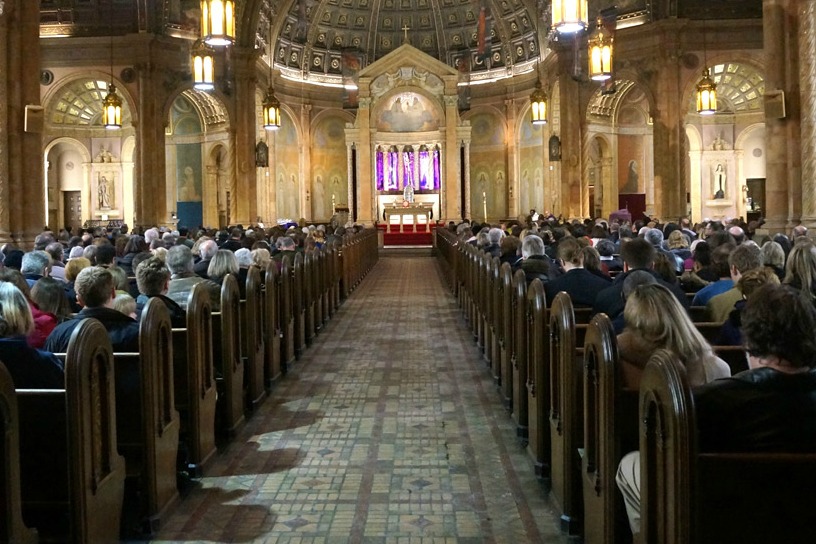The first time I attended Mass while studying abroad in Italy six years ago, I was nearly trampled in the sudden surge forward at Holy Communion. The nice, familiar, genteel, orderly lines cultivated through years of practice back home in the States? Totally abandoned. At first, I thought it was just an Italian thing, like the frenetic and bewildering rush for one’s daily cappuccino e cornetto in the cramped, boisterous cafes of Rome; but it happened again, in Berlin, London, Jerusalem, Paris, and Sydney, and I continue to see it on a daily basis in my current parish in Wexford, Ireland.
Initially disoriented and slightly put-off by the unceremonious, mad dash towards the altar, in time I became struck by the same sharp and visceral tug towards the sacrament that the rest of assembly felt. I began to understand--sure, why wait and go through the rigmarole of polite, solemn procession, faux-patiently waiting in line, eyes piously cast downward, when you can go and receive the Lord in the very instant you wish (although preferably while not knocking anyone else down along the way)?
This foreign phenomenon is given a voice through one of the prayers the priest murmurs quietly during the Communion rite:
“May the receiving of your Body and Blood, Lord Jesus Christ, not bring me to judgment and condemnation, but through your loving mercy be for me protection in mind and body and a healing remedy.”
Or alternatively,
“Lord Jesus Christ, Son of the living God, who, by the will of the Father and the work of the Holy Spirit, through your Death gave life to the world, free me by this, your most holy Body and Blood, from all my sins and from every evil; keep me always faithful to your commandments, and never let me be parted from you.”
Never let me be parted from you. Never let me be separated from you by either not partaking in this holy sacrament (unless I am in a state of mortal sin), or by waiting in my pew longer than is really necessary. May the Eucharist be protection for me in mind and body, and may it be a healing remedy. When a family member falls ill, do we not rush to call a doctor, or to gather medicine for them so that they can be healed? This survival instinct can be applied to our relationship with Christ: when we are ill in mind or spirit, we rush to our Lord, the Divine Physician, in order to find healing, comfort, and peace.
Pope Francis has referred to the Church as akin to a field hospital after battle--tending the wounded, nourishing the brokenhearted, warming the hearts of the faithful in her nearness and love. I see this every single day at Mass in the rush towards Communion; the longing for nourishment and warmth, when the faithful receive “the bread of heaven” and “the cup of salvation,” the body and blood of Christ who offered himself for the life of the world (John 6:51). Through Holy Communion, the gentleman in his late 80s I often see hobbling painfully, doggedly in line receives the strength to carry on; the bereaved are showered with abounding love and consolation; the new immigrant families in the parish find peace and unity within the congregation assembled for worship, the catholic Church made visible. In Holy Communion, the tired and the lonely, the broken and betrayed lift their eyes and their hearts to the tender caress of Christ’s healing touch in the Eucharist.
During the purification following Communion, the priest may pray quietly--although I love when he says these words aloud: “What has passed our lips as food, O Lord, may we possess in purity of heart, that what has been given to us in time may be our healing for eternity.”
Christ loved us “to the end,” and gave us the Eucharist so that we might love him likewise (John 13:1). The Eucharist, when received at the end of life in viaticum, is the sacrament of passing over from death to life. On a daily and weekly basis, it is a sacrament that helps us prepare for our heavenly homeland, and provides spiritual sustenance while we make our earthly pilgrimage.
“Our way of thinking is attuned to the Eucharist, and the Eucharist in turn confirms our way of thinking,” St. Irenaeus said.1 And he’s right! In the Communion Rite, we dare to say the words our Savior taught us; we implore that the reception of Christ’s Body and Blood in the Eucharist be a protection against and remedy for life’s very real pain and suffering. The prayers within the Communion Rite express our longing to be protected and nourished, and we come away from the Mass healed, unified, enlightened, and ready to face the world, our hearts inflamed by the love of Christ. And so, may the Body and Blood of Christ keep us safe for eternal life.
1St. Irenaeus, Adv haeres. 4, 18, 5: PG 7/1, 1028.



